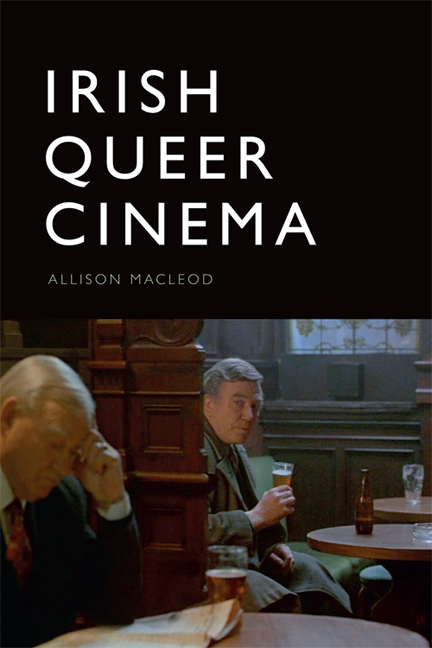Book contents
- Frontmatter
- Contents
- List of Figures
- Acknowledgements
- 1 Queerly National and Nationally Queer: Paradoxes of an Irish Queer Cinema
- 2 Mapping Ireland’s Queer Films
- 3 Re-imagined Kinship and Failed Communities
- 4 The Contested Space of the Irish Pub
- 5 Compartmentalised Cosmopolitans and Rigid Fluidity
- 6 The Queerly Productive Constraints of Rural Space
- 7 Queer Mobilities and Disassociated Masculinities
- 8 Contested Belongings within Diasporic Space
- 9 The Irish Queer Short Film
- 10 Concluding Remarks
- Select Filmography
- Bibliography
- Index
- Frontmatter
- Contents
- List of Figures
- Acknowledgements
- 1 Queerly National and Nationally Queer: Paradoxes of an Irish Queer Cinema
- 2 Mapping Ireland’s Queer Films
- 3 Re-imagined Kinship and Failed Communities
- 4 The Contested Space of the Irish Pub
- 5 Compartmentalised Cosmopolitans and Rigid Fluidity
- 6 The Queerly Productive Constraints of Rural Space
- 7 Queer Mobilities and Disassociated Masculinities
- 8 Contested Belongings within Diasporic Space
- 9 The Irish Queer Short Film
- 10 Concluding Remarks
- Select Filmography
- Bibliography
- Index
Summary
The 2015 same-sex marriage referendum was a ground-breaking moment for queer politics and identities in Ireland. In 2017 famed Irish drag queen Panti Bliss spoke about the impact of the referendum, which ‘has had a liberating effect and it had a transformative effect on the country’ (Knox 2017). For Panti, the popular vote in favour of same-sex marriage resulted in a new national imagining predicated on the political and social inclusion of sexual minorities: ‘we – Irish queers – are in a unique position where we know quantifiably how the rest of the country feels about us because we had a huge debate and voted on it’ (Knox 2017). In looking at how Ireland has evolved from a past of sexual repression and homophobic persecution, ‘it's wild how queer Ireland has become’ (Knox 2017).
Panti's comments underscore the queer–national relationship that is a key focus of this book. Queer theory undermines the idea of a national community as a natural and unified formation by exposing the gaps and forms of unbelonging that are necessary for sustaining the nation's claims of hegemony and by revealing those who are excluded and marginalised within the national narrative. At the same time that queerness has the disruptive potential to dismantle the national, it opens up new possibilities for national re-imaginings. This book has not only explored how queerness reveals the inconsistences of the nation and the national subject, but how it in turn enables new socialities and spatialities to form. It therefore suggests that the relationship between ‘queer’ and ‘national’ is not one that is wholly incompatible but rather one where the terms inform one another in multiple and complex ways.
In the wake of Ireland's marriage referendum, this book is a timely intervention into debates surrounding the role of sexuality within the constitution of Irish national culture. Irish Queer Cinema focuses on feature-length and short films released between 1984 and 2016 to provide the first extensive critical study of Irish queer cinema. It moves beyond a more traditional historical approach to Irish cinema by developing spatial models of queer society that explore the ways in which particular socio-cultural spaces (the family, the pub, the city, the countryside, the nation-state, diaspora, the short film) encode queer relations and how these spaces are simultaneously re-inscribed into a national narrative that represents ‘Ireland’.
- Type
- Chapter
- Information
- Irish Queer Cinema , pp. 160 - 161Publisher: Edinburgh University PressPrint publication year: 2018



